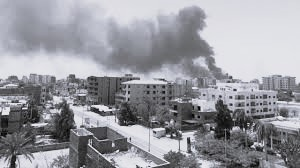A disastrous different consequences resulted from – though still- the ongoing military conflict in Sudan since mid of last April. The marathonic negotiations internally and internationally led by regional and other states with no avail to put an end to this incredible conflict as depicted by its ignitors. The war has been widened to stretch along the country in the west regions of Darfur and Kordofan states with gross human violations tragedy. Both fighting factions Sudan Military SAF and paramilitary Rapid Support Forces RSF haven’t succeed on the battlefield either. They politically subjected to indirect negotiation sponsored by meditators from different countries especially the regional bodies such as The Intergovernmental Authority on Development IGAD and Saudi-America-led Negotiation in Sadui city of Jeddah. At this stage only military voice is heard in exclusion the civil one.
Recently, civil political fronts under the umbrella of the Forces of Freedom and Change have assembled in Egyptian Capital Cairo to discussing the Sudanese question. It’s the first time that a civil democratic front appeared on the conflict scene. They announced a political initiative roadmap to handle the issue at debate—however, whatever their will and persistence to addressing the crisis from a peaceful political view it would have been remain a marginal voice admit chaotic atmosphere replete by hatred and violence discourse. Such a situation has transformed the conflict into a tribalized one in the plethora of multiethnic community. If the current conflict keeps on going will be escalated to a turning point where it would have been deepening the crisis. Sudan is a country with so many cracks in terms of national cohesion and political unity, not mentioned the socioeconomic difficulties.
A devasting conflict should be addressed by different means, both Generals Abdel Fattah Abdelrahman al-Burhan Sudan military leader and Mohamed Hamdan Dagalo Rapid Support Forces must have considered the historic moment in which they’re involved. The principal combatants SM and RASF seemed to lack both the will and vision not only to control the military operations, but how to justify their strategic positions if any. As if no one like to give an impression of weakness and defeat, they ignored the deteriorating humanitarian crisis in casualties, rape, ethnic cleansing, and many atrocities have been committed by the two fighting factions.
Despite the time consumed, no just deal has been reached. In addition to that, talks were suspended many times. Some regional initiatives were denied by the regime in Khartoum under the claim that it’s threatening Sudan sovereignty. The failure of peace processes reflected the impact of political dysfunction and unseriousness and maneuvering manipulated by fighting parties’ leaders. The result is that the quest for peace is complicated by political and military elements regardless of the efforts and wills expressed by different mediators and facilitators.
Last month, in the pursue of stability and avoiding spread of Sudan’s war into its neighboring countries a summit at presidential level was held in Cairo presided by Egyptian President Abdel Fattah el-Sisi. As expected, the summit emphasized a cease-fire and solving the conflict on negotiation table by calling all futile parties military and civilian altogether. Indeed, Egypt is important player in Sudan dilemma, but no peace formula was presented. Any country has its own interest whether in peace or war, this rule often governs a country’s political and security priorities. Ostensibly, the nature of the conflict seemed like an internal crisis, but regional and international actors are likely behind the scenes. Such interference has fueled the conflict and no party, for political or diplomatic reasons can admit expressed it. That’s why there’s a proxy element playing a crucial role in complicating the situation at all levels.
It would be impossible for Sudanese national initiatives contribute to any active peace progression because the only preferred so far solution for the fighting groups is still depending on military means which in turn seen plausibly inaccessible. Peace must involve many factors including grassroots elements of the civil societies and all other non-military activities that could rationally inject the nature of the conflict by newly peace vision. To silence guns no matter the means that will be used in the long road to a just sustainable peace.
As peace initiations from different corners are striving to bring Sudan devasted conflict into an end, all Sudanese politicians are calling to perceive the reality on the ground before it would be too late. Whatever the type of negotiation and peace talks, Sudanese politician are also called to enhancing their national interest in preserving a country on the brink.

